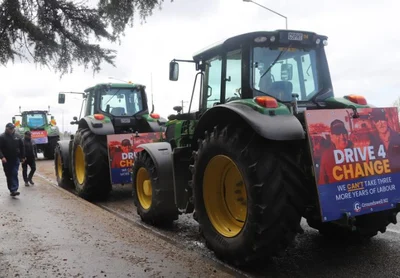Rough year for rural sector

Farmers and rural communities across New Zealand had another tough, tighten-the-belt type of year in 2023 - and the Ashburton District was no exception.
A drop in farmgate milk price forecasts left many dairy farmers in Mid Canterbury feeling the squeeze on profits. The outlook for farmers with larger debts dropped to marginal or into negative territory as the cost of borrowing jumped.
Dairy farmers were not alone as the prices farmers are paid for most products dropped as a challenging global market affected exports from New Zealand. Farmers were hit hard with a rise in farm input costs at the same time.
On-farm inflation was above the national inflation levels as the cost of machinery, fertiliser and other inputs, along with fuel, sky-rocketed.
This meant most farmers put all non-essential spending on hold, which had a ripple effect in our local economy.
With farmers doing it tough and spending less, there were fewer sales and less income for the many local businesses that supply the rural sector. The flow-on effect meant less money for salaries and wages, and less money circulating in the Mid Canterbury economy.
Ruralco’s staff restructure and $2-million loss for its financial year to the end of June is an example of this.
Farmers were also feeling frustrated as the Labour government pursued environmental policies which in many cases asked farmers to meet emissions or water quality targets they felt impossible to achieve – and pushed up the costs that farmers needed to foot, or pass onto consumers, even further.
Groundswell NZ's convoy for change in September was an expression of that frustration. Several farmers passing through Ashburton expressed concern that times on-farm were as tough as the 1980s when many farmers went under and had to sell up.
Groundswell co-founder Bryce McKenzie said a lot of farmers were feeling disheartened at being labelled polluters and environmental bandits.
"We are the greatest farmers in the world. Science shows us that and we need to be sticking to the science."
McKenzie said rural New Zealand was really suffering with a combination of low farmgate prices and increased regulation and costs.
He said there was a generation of people growing up who will not want to be farmers because of the stress and stigma attached to it.
September was also the month farmers’ confidence has hit a record low according to a Rabobank survey. It found confidence in the agricultural economy had dropped even deeper into negative territory to -72% - the lowest reading in the survey’s 20-year history.
The survey found more than three-quarters of farmers expected agricultural conditions to worsen over the next 12 months. This was up 12% from the last survey in June.
Only 5% of farmers expected conditions to improve and 15% expected conditions to stay the same.
Lower commodity prices was the main cause of farmer anxiety, according to the survey.
But 2023 wasn't all bad news. New Zealand came a step closer to being the first country in the world to eradicate Mycoplasma Bovis.
The eradication programme started in 2018 hit a milestone of zero active cases early in August, before two infections were discovered on dairy farms in Selwyn.
Earlier this year, the top upcoming farmers were celebrated as they battled it out for the coveted title of Young Farmer of the Year at the nearby Winchester showground in July.
Local Pendarves Young farmers club Peter O'Connor was in the line-up of seven finalists representing the Aorangi region. He took home second place missing the title by a small margin to Waikato Bay of Plenty farmer Emma Poole.
Local farmers are making strides in sustainable farming and sharing their knowledge through local catchment collectives.
With the change in government and the promise of a more collaborative approach to greenhouses gasses and other environmental issues, farmers are likely to be heading into 2024 with a feeling that there is light at the end of a dark tunnel.
Coalition partners are well presented in the agricultural space and the inclusion of new ministers with a strong agricultural background is expected to feed into more pragmatic regulations for farmers.
While meat and other commodity prices are still subdued, Fonterra’s average farmgate milk price forecast has recovered to $7.50 up from a low of $6.75 that was below breakeven for many Mid Canterbury dairy farmers.
By Sharon Davis

